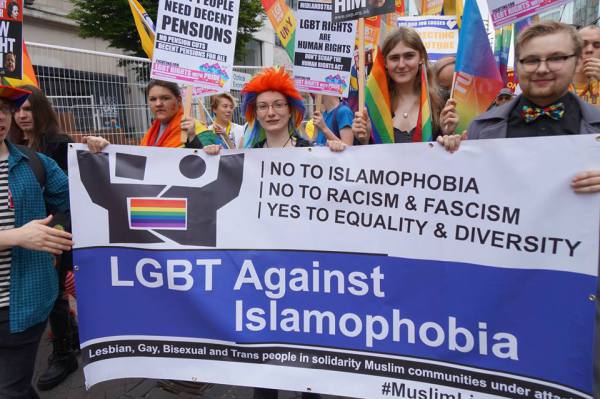par David Rand, Romain Gagnon, Mandana Javan et Daniel Baril
2025-04-26
Réponse à une lettre de Françoise David, Louise Harel et Christine St-Pierre, parue récemment dans La Presse. Les trois auteures s’opposent au Projet de loi 94 qui renforcera la laïcité dans les écoles québécoises.
Summary in English Response to a letter by Françoise David, Louise Harel and Christine St-Pierre, recently published in La Presse. The three authors oppose Draft Bill 94, which will strengthen secularism in Quebec schools.
En lisant la lettre « Une surenchère qui discrimine les femmes » signée par Françoise David, Louise Harel et Christine St-Pierre (La Presse, 22 avril 2025), on ne peut s’empêcher de penser à cette célèbre photo de manifestants arborant des drapeaux arc-en-ciel et une banderole « LGBT Against Islamophobia ». Le problème ? Dans plusieurs pays musulmans, les personnes ouvertement homosexuelles sont persécutées, voire exécutées. Cette image est devenue un symbole d’un militantisme naïf, pour ne pas dire suicidaire, où l’idéologie prime sur l’intérêt objectif des minorités qu’on prétend défendre.
 Source: LGBT Against Islamophobia
Source: LGBT Against Islamophobia
Se battre contre ses propres intérêts n’est pas rare. On peut en sourire lorsqu’il s’agit d’un électeur de Trump. Mais quand trois figures publiques défendent, au nom du féminisme, le port du voile islamique — probablement le symbole le plus antiféministe de notre époque — cela relève d’une forme d’aveuglement militant particulièrement préoccupante.
Les trois signataires semblent ignorer, ou feignent d’ignorer, le sens profond du voile dans certaines interprétations de l’islam : une obligation imposée par des hommes pour signifier l’appartenance de la femme à la communauté, à sa famille ou à son mari. En ce sens, le voile n’est pas un simple choix vestimentaire, mais l’uniforme d’une soumission intériorisée. C’est pourquoi il choque de voir des femmes défendant ce symbole comme un outil d’émancipation.
Il est vrai que la Loi sur la laïcité de l’État, bien qu’universelle dans son application, affecte davantage les femmes musulmanes pratiquantes. Mais ce n’est pas la loi qui discrimine : c’est la prescription religieuse elle-même, qui soumet la femme à une injonction vestimentaire en contexte patriarcal. La loi, elle, se contente de fixer des règles de neutralité dans certaines fonctions. Et oui, un signe religieux, cela s’enlève.
À la question rhétorique des signataires — « Ira-t-on jusqu’à empêcher une intervenante voilée de parler d’éducation sexuelle dans une école ? » — il faut répondre avec rigueur. D’abord : oui, en contexte scolaire, cette intervenante doit retirer son voile. Ensuite : une femme qui porte le voile est-elle la mieux placée pour animer un atelier sur le consentement et la sexualité ? Rien n’est moins sûr, puisque le voile véhicule une vision du corps féminin fondée sur un affichage public comme signe de soumission, et sur la culpabilité découlant de sa présumée infériorité sexuelle. En effet, selon cette vision, c’est la femme qui est tenue responsable de toute inconduite sexuelle des hommes à son égard.
Quant à leur insistance sur l’absence de signalements de prosélytisme : croire qu’un symbole religieux ostentatoire n’est pas, en soi, une forme de prosélytisme, c’est méconnaître ce qu’est un symbole. Porter un signe religieux visible, c’est faire acte de visibilité idéologique. Ce n’est pas neutre, encore moins dans le cadre scolaire.
Enfin, quand ces trois femmes évoquent la « liberté de choix » des femmes, on se demande si elles appliquent ce principe à toutes. Les policières ont-elles le choix de ne pas porter l’uniforme ? Pourquoi certaines femmes seraient-elles exemptées des règles communes au nom d’un prétendu droit à l’expression religieuse ? Le principe d’égalité exige que toutes les citoyennes soient traitées selon les mêmes standards, y compris en matière de neutralité.
Le féminisme des signataires est celui de l’intersectionnalité dévoyée, où les droits des femmes passent après les revendications identitaires et religieuses. Ce n’est plus un féminisme de l’émancipation, mais un féminisme de la capitulation.
- David Rand, président Libres penseurs athées (LPA)
- Romain Gagnon, porte-parole des Sceptiques du Québec
- Mandana Javan, militante laïque
- Daniel Baril, président, Mouvement laïque québécois (MLQ)
Prochain blogue: Comprendre le « wokisme » à l’ère du MAGA